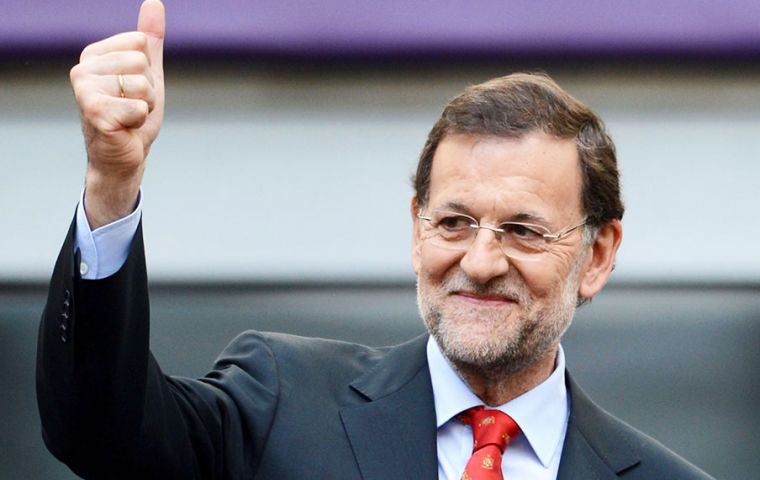MercoPress. South Atlantic News Agency
Rajoy on course to a minority government; Socialists decide to abstain in confidence vote
 Rajoy’s minority government will have to contend with a hostile, deeply fragmented parliament over the next four years
Rajoy’s minority government will have to contend with a hostile, deeply fragmented parliament over the next four years  December’s election broke the stable two-party system that has ruled Spain since the death of Dictator Francisco Franco in the 1970s
December’s election broke the stable two-party system that has ruled Spain since the death of Dictator Francisco Franco in the 1970s Spain’s conservative leader Mariano Rajoy was on course to secure a second term in power for his People’s Party (PP) on Sunday after his Socialist rivals agreed to abstain in a looming confidence vote, ending 10 months of political deadlock. Spain has been stuck in political limbo following national elections in December and June which left no single party with a majority, paralyzing institutions and threatening to derail an economic recovery.
With a third ballot on the cards the centre-left Socialists, traditional opponents of the PP, ceded ground on Sunday in an extraordinary, internal party meeting to choose between a third general election or allowing Rajoy to govern.
Senior party members voted by 139 to 96 in favor of abstaining in a parliamentary confidence vote to be held this week.
Rajoy’s minority government will have to contend with a hostile, deeply fragmented parliament over the next four years, opening up a fresh source of political instability for Spain. His prime task will be to keep on track an economic rebound after years of recession, while cutting costs to meet stringent deficit targets.
December’s election broke the stable two-party system that has ruled Spain since the death of dictator Francisco Franco in the 1970s, and a re-run in June delivered a similar result as new parties grabbed millions of votes in the wake of a deep recession.
Rajoy’s PP beat the Socialists in both elections, followed by the upstart Podemos (“We Can”) and Ciudadanos (“Ciudadanos”) parties, which together secured close to a third of parliamentary seats.
To govern, Rajoy needed sufficient support or an abstention by his rivals in a confidence vote. That two-stage ballot will now take place this week, with the second vote due on Saturday or Sunday.
The Socialists had blocked Rajoy’s reelection under their former leader Pedro Sanchez, a stance that would have forced Spain into its third election in a year. Sanchez was forced to resign earlier this month by his party, who feared the Socialists would suffer an electoral bloodbath if they triggered a fresh poll.
Defending the vote, Socialist interim party head Javier Fernandez said the result was the least bad of the two options. “We went to win the elections, but since that didn’t happen, we need that there is a government to act as the opposition,” he said.




Top Comments
Disclaimer & comment rules-

Read all commentsThe Spanish government believes that self-determination does not apply to Gibraltar because paragraph 6 of UN Resolution 1514 (‘any attempt aimed at the partial or total disruption of the national unity and the territorial integrity of a country is incompatible with the Charter of the United Nations')
Oct 24th, 2016 - 02:02 pm -1This view is pathetically weak: https://www.academia.edu/29347730/Gibraltar_-Territorial_Integrity
Time for Rajoy, Margallo & co get real.
Commenting for this story is now closed.
If you have a Facebook account, become a fan and comment on our Facebook Page!